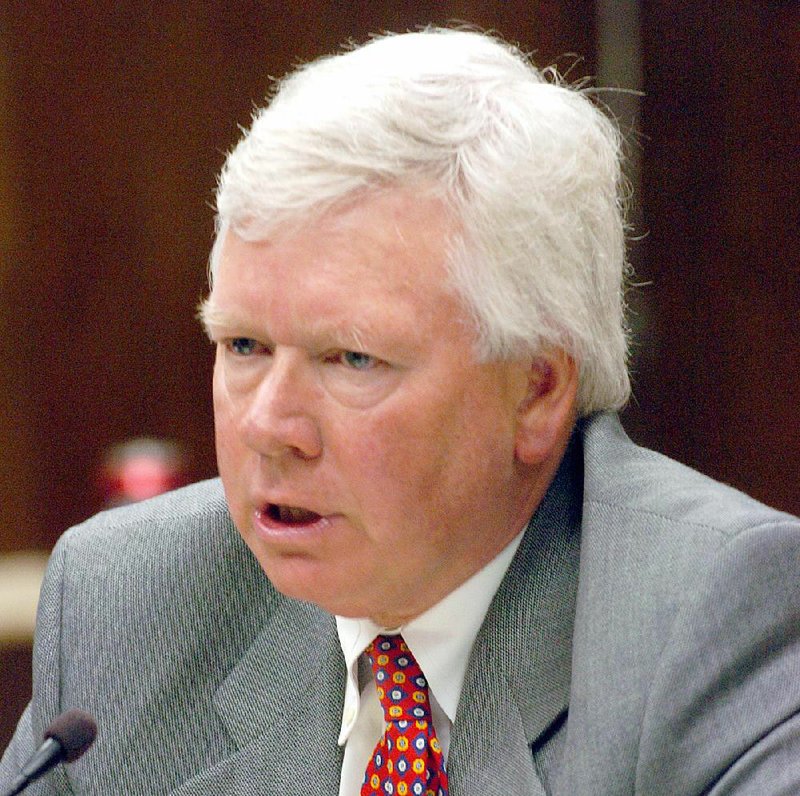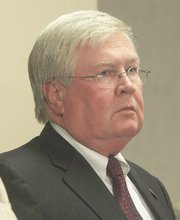On a Friday afternoon in February, North Little Rock police discovered a body at the Jefferson Manor apartment complex. Multiple pieces of evidence pointed detectives to Gary Smith, 60, who was arrested about a week after the victim was stabbed five times in the chest and neck.
RELATED ARTICLE
http://www.arkansas…">Little help available for rising caseloads
Paired with a public defender, Smith and his first-degree murder case will go before Pulaski County 9th Division Circuit Judge Mary McGowan -- who has seen Smith before. In 2014, Smith participated in the county's drug court, a strenuous treatment program for nonviolent offenders who are dependent on drugs or alcohol.
For 21 years, Pulaski County's drug court has been under the authority of McGowan, whose courtroom also hosts a veterans treatment court and a small percentage of civil cases. But it wasn't until recently that her courtroom began handling criminal cases like Smith's murder charge, and the change has left the county public defender and prosecuting attorney scrambling to provide legal staff for those cases.
In September, the 17 judges of the 6th Judicial Circuit unanimously decided that, come 2016, McGowan's court would handle the criminal cases of defendants in drug and veterans court who had picked up new criminal charges. Previously, those new criminal charges had been transferred to the circuit's five courts designated to hear criminal cases.
The change caused an unexpected increase in the number of cases in the 9th Division. Without notice, criminal cases and bench and jury trials began showing up on the 9th Division's docket.
"Instead of having trial dockets in five courts, under this we've got them in six, and I don't have the personnel to cover it," Pulaski County Prosecuting Attorney Larry Jegley said.
According to circuit judges, the change greases the wheels of the circuit's caseload-distribution system by, among other things, consolidating a defendant's drug and criminal cases in a single court with a single probation officer.
"When you say you're going to have to see two different probation officers, and you're going to have to have two different probation fees, it just doesn't make a whole lot of sense," McGowan said. "In some instances, you realize you could set these people up for failure."
While the change provides what McGowan calls "judicial economy," it has added another measure of stress to the public defender's office and prosecuting attorney's office, which said they already are spread thin.
Pulaski County Public Defender Bill Simpson said each of the 26 full-time attorneys in his office handles about 300 felony cases annually, twice the maximum caseload recommended by the National Advisory Commission on Criminal Justice Standards and Goals. And Jegley said he feels he is short 14 attorneys in his office of 46.
What's most irksome to Jegley, he said, is that the change was not outlined or mentioned in the circuit court's Case Assignment Plan, an administrative rule book that is reviewed and approved by the state Supreme Court every two years.
The current iteration of the plan went into effect in January after the high court approved it last fall. But without mention of the change, the appearance of criminal cases in the 9th Division caught Simpson and Jegley flat-footed.
"It's good to have good communication with them, and we try to," Chief Circuit Judge Vann Smith said. "We probably didn't think this was going to be such a monumental issue, to tell you the truth."
McGowan and Vann Smith said that even without a specific outline in the Case Assignment Plan -- or Supreme Court approval -- the change is allowed under Amendment 80 to the Arkansas Constitution. Ratified in 2000, the amendment gives circuit judges the authority to package "related cases" into a single court. It's only recently that they decided to carry that practice over into drug and veterans court.
"And that happens all the time," Smith said. "And it's not in the [Case Assignment] Plan. We've been doing it for years; it just makes sense to do it."
The more than 4,000 annual criminal cases in the county are distributed among five of the circuit's 17 courts: three full-time criminal courts, which heard 1,191 cases each in 2014; and two part-time courts that each heard 390 criminal cases that same year.
Simpson assigns four public defenders to each full-time court and two defenders to the part-time courts, while Jegley assigns up to seven and four prosecutors in each, respectively.
In the 9th Division, Simpson has one part-time attorney who represents a large majority of the drug and veterans courts' steady stream of nonviolent cases -- 775 total, according to 2014 numbers. But that part-time public defender, Simpson said, is poorly equipped to handle criminal cases.
"We're having to pull people who have a full caseload out of these other circuit courts to come in their spare time to come take care of this capital murder, this aggravated robbery, or this rape case," Simpson said.
Between January and May, 64 criminal cases aggregated in the 9th Division, according to a docket report. Fifteen of those cases have been disposed of, McGowan said, with 12 people pleading guilty for re-admittance into the drug or veterans court program and three sentenced to prison.
That sample size nearly reflects the countywide percentage of defendants who enter pleas of guilt in lieu of going to trial. According to Jegley, only about 10 percent of criminal cases go to trial.
Yet Gary Smith's first-degree murder case may fall into that 10 percent. During an attempted psychiatric evaluation by Arkansas State Hospital doctors, Smith refused to undergo testing, maintained his innocence and denied "any desire to rely on a defense of not-guilty by reason of mental disease or mental defect," according to court documents.
His case was poised for trial until his court-appointed defender, Tom Devine, stepped in and, believing Smith could not form intent because of mental illness, requested another mental evaluation to determine Smith's mental state at the time of the killing.
However, if a subsequent evaluation finds him competent and mentally fit, a murder trial would require, on average, about 60 hours of preparation by his appointed attorney, Simpson said.
Staffing problems are not unique to Pulaski County's public defender's office. The 300 annual felony cases per attorney is a common caseload for public defenders across the state, said Gregg Parrish, executive director of the Arkansas Public Defender Commission.
"The need is constant," Parrish said. "Every system in the state is strapped," and by his estimation, each circuit is in need of at least two additional attorneys.
However, according to Little Rock attorney and former Public Defender Omavi Shukur, the state's Legislative Criminal Justice Oversight Task Force has responded to that need apathetically. During the past legislative session, the Public Defender Commission requested funding for 46 attorney positions statewide with salaries at $35,000 per year. Only three were awarded.
"They haven't been talking really at all about providing better-quality representation for people accused of crimes," Shukur said.
"It's not easy to get money to defend criminals, but you have to do it, you should do it," Vann Smith said. "You're talking about people's rights, and hopefully they're being protected."
Without immediate reprieve from the state, Simpson and Jegley petitioned the Pulaski County Quorum Court in April to provide temporary funding for a deputy prosecutor and a public defender to be assigned to the 9th Division. The Quorum Court spent about two months deliberating over the proposal, which would have allotted $110,312 of county funds to pay the salaries and benefits for the positions until the 2017 legislative session, when state funding might be secured.
"What we're looking for is a bridge to give us time to get funding in place," Jegley told the Quorum Court during last month's meeting.
"It's like getting in a car wreck right now, but they don't sell cars except in January of next year. How are you going to get around? That's the kind of position that we're in," Jegley said.
Similar arrangements have been made in other jurisdictions, including Washington, Benton and Miller counties, but Pulaski County officials balked at the prospect of using county dollars to fulfill state financial obligations. By June, the effort died in the Quorum Court because of concern that such an arrangement would create an unwanted precedent.
With that avenue exhausted, Jegley said he will search for alternatives.
"I don't begrudge anybody," he said. After all, "we don't prosecute in the name of Pulaski County, we prosecute in the name of the state of Arkansas."
Meanwhile, without other grant options at his disposal, Simpson requested that the county exclusively fund a public defender position for the remainder of 2016, at half the cost of the previous joint proposal.
On Tuesday, Simpson again went before the Quorum Court to advocate for his proposal. Members were concerned that the county would be stuck with the bill in the future if it were to provide funding in lieu of the state now.
District 5 Justice of the Peace Lillie McMullen said she worried that state lawmakers would be less inclined during the 2017 legislative session to fund the position if county funds were already filling the need. Other Quorum Court members described the proposal as opening a "Pandora's box" of county funds fulfilling state responsibilities.
But Simpson asked the justices of the peace to consider what type of representation they wanted for those who are accused of crimes.
"How do you want to represent the people that are in orange? You probably don't think about that much," Simpson said Tuesday. "How do you want to represent the veterans that have fought in Vietnam, Afghanistan, Iraq and now find themselves in the criminal justice system? And how do you want to represent the people that are in drug court trying to rehabilitate themselves? That's what this position is all about."
After his testimony, the Quorum Court agreed by an 8-5 margin to vote on the proposal later this month.
"The position I'm asking for from the county is just one position," Simpson said in a recent interview. "It's just going to solve one little problem we have, but you have to solve one problem at a time."
Information for this article was contributed by John Lynch of the Arkansas Democrat-Gazette.
Metro on 06/19/2016

